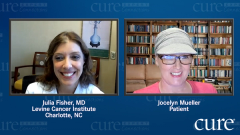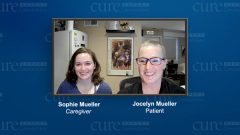
The Importance of Support Networks for HER2-positive Breast Cancer
Julie Fisher, M.D., has a conversation with patient Jocelyn Mueller about the importance of good support networks when living with HER2-positive breast cancer.
Episodes in this series

Julie Fisher, MD: Are there any questions that I haven’t asked? Is there anything that you think patients who face this process should know?
Jocelyn Mueller: The whole process is doable. I will say, reach out to people and take help from people. Ironically, about a month or two before I got diagnosed, I saw this beautiful thing on Facebook that said, if you want to know how much you are loved, get cancer. I have felt that tremendously, and I want to say, let people help you. It’s hard for women, it’s hard for moms; we just want to keep doing everything and taking care of others. We don’t like asking for help. However, people like to feel useful. I think, let people help you and feel what you feel; what you’re feeling is valid. Everyone says, “Oh, a positive attitude goes so far.” Yes, it does, but it’s OK to have days when there’s no way to feel positive about this. I had guilt about that early on, and Dr Fisher, you said to me, “Think about how you would feel if this was your mom or your daughter. Don’t feel guilty about not being able to help, and don’t feel guilty about being sad or being sick. This is just what you have to go through, and show yourself the same compassion you would show the people you love.”
Julie Fisher, MD: I find myself giving that advice often. I marvel at how hard it is for a lot of us to give ourselves the same compassion and kindness that we are so easily able to give other people. Who is involved in your support network, both here in the office and at home?
Jocelyn Mueller: You, [Richard] White, [M.D.,] Callie, and Kathy, primarily. Then any of the nurses I have on the infusion floor. The whole team there is amazing. At home, I have my husband, and my younger daughter, who is 17, has been a terrific help. She shaved my head; she was so happy to help. My older daughter is away at school, but she comes home when she can. My mother lives around the corner, and I have neighbors and work friends. Like I said, I have a support system I wouldn’t have imagined. Unfortunately, I’m in a club now with some people who have been through this, and we’re closer now for it, I would say.
Julie Fisher, MD: It’s so important to have that network of support. On my side of things, it’s so important to have a network of collaboration, a network of colleagues. I’m very fortunate, at the center where I work, we have a multidisciplinary breast clinic. We have multiple academic conferences where we discuss cases, go over slides, and go over pathology and imaging. It’s a big team. There are a lot of people who are involved in each of my patients’ care, many of whom you might never meet. Your first stop along this path, of course, was with our colleagues in radiology. We’ve got doctors who read the mammograms, and perform the biopsies. Of course, our team in pathology is responsible for making accurate diagnoses. I think we’ve emphasized how important that hormone receptor and HER2/neu status are. Really, they drive what treatments are chosen and what outcomes we see from those treatments; it’s important to have a solid team of pathologists. There is the surgical oncologist, there is me, the medical oncologist, and of course, many patients will also undergo radiation and meet with our colleagues in radiation oncology.
Beyond that, here, we have a whole network of social workers, psychologists, psychiatrists. For women who are interested in preserving fertility, which can of course be affected by chemotherapy, we have a team of reproductive endocrinologists. We’re fortunate to offer a very robust supportive and integrative oncology panel as well. They focus on more holistic aspects of care, things like massage and acupuncture. These days, a lot of people are interested in supplementation, which I support if it’s something that will be helpful. I am not excited about if it’s something that’s going to be potentially harmful. Sometimes supplements can interact with the drugs that I’m prescribing. It’s nice to have people who have real expertise in that to help us tease out what’s appropriate and what’s not. If any of my colleagues are watching and I’ve left you out, I apologize.
I would be remiss not emphasizing what you’ve already touched on, which is the incredible support we get from our nursing staff. My clinic nurses are the backbone of everything, and are available for questions, big and small. It’s a hard process to walk through. Fortunately, you had the benefit of a sister in medicine and a friend who had walked through this before, so at least you had some sense of the vocabulary of cancer treatment. Some people walk in with no exposure to these things. I can’t even begin to imagine how overwhelming it must be. It’s complex concepts, it’s drugs that sound like word salad. It’s got to be a lot to take in if it’s not something you’re familiar with. We have a system of nurse navigators who help navigate, who help people, “OK, where am I going? When? What’s this doctor for? What’s this for?” I can imagine those first visits would just feel overwhelming. The nurse navigation system, when at its best, helps make sense of things for people. Obviously, I’ve been front and center as the person who’s been prescribing the chemotherapy and following up on the chemotherapy, but there is an army of people behind the scenes who have contributed and continue to contribute to your care.
Transcript edited for clarity.

